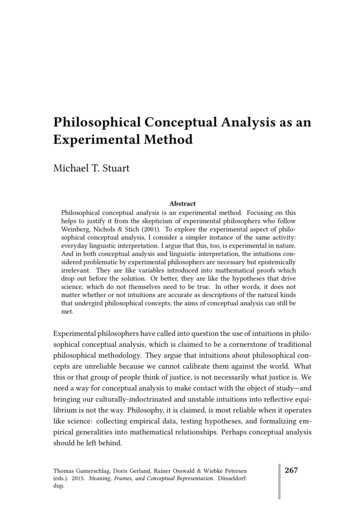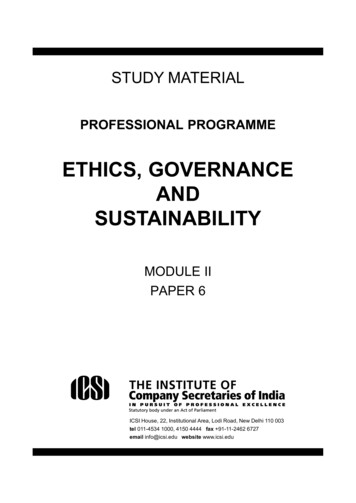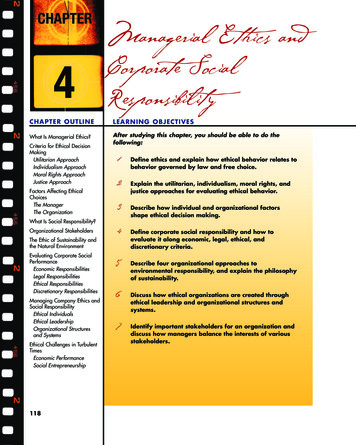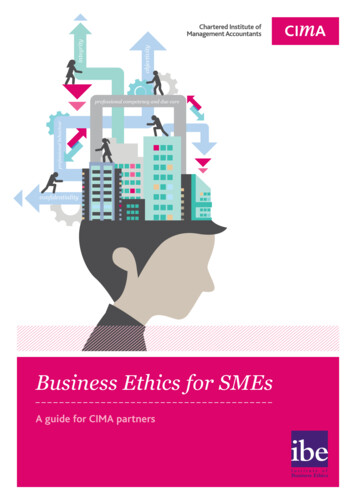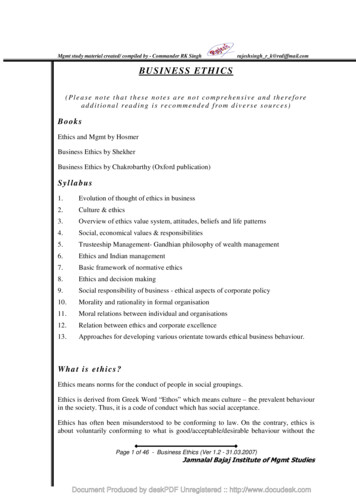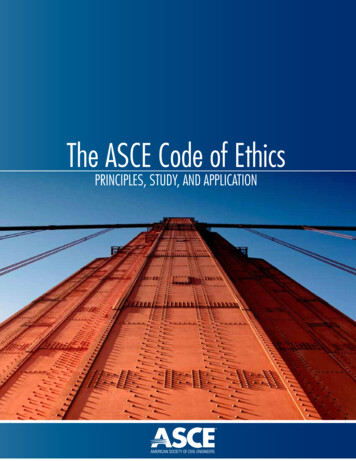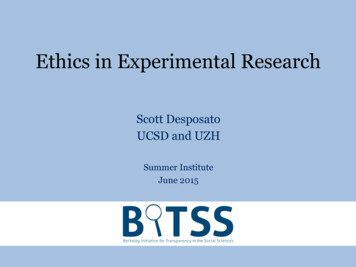
Transcription
Ethics in Experimental ResearchScott DesposatoUCSD and UZHSummer InstituteJune 2015
Topics for Today There are some real ethical issues associated with manyof the things we are doing today. These are especiallycommon when working overseas. Existing institutions - including our IRB’s - don’t providesufficient guidance. Indeed, that’s not their mission! Whether or not we are willing to admit it, self-interestcan restrict our ability to assess ethics impartially. I will identify some of the issues, with examples, anddiscuss the different opinions on emerging ethical issues. I will also offer suggestions for avoiding trouble, butthese come with a cost.June2015BITSSSummerIns,tute2
Ethical issues in Social Science? “You’ve got to be kidding me!?!” Treatments are almost always fully legal activities thatsubjects might encounter in their daily lives. What’s thebig deal? Many experiments in the past were limited to laboratoryenvironments with little deception, full debriefing, andno impact on the real world. The real risk to our subjects: boredomJune2015BITSSSummerIns,tute3
One Measure of RiskAuthors30Total Subjects104,000Adverse Incidents1Reports of .org/DBASSE/BBCSS/CurrentProjects/DBASSE\ 080452\#.UYA\ Rit37IwJune2015BITSSSummerIns,tute4
What’s Changed? Number of Experiments: Social scientists are conductingmore and more experiments, and they are bigger andbigger. Location of Experiments: These experiments are not justin the United States anymore, but have spread across theglobe. Type of Experiments: We aren’t just having undergradsplay Dictator Games in class for extra credit. Some Data: AJPS, APSR, JOP, IO, JCR, CPS, CP;1990-2013 and 1960, 1970, 1980June2015BITSSSummerIns,tute5
What’s Changed? More Experiments8624Percentage1012Experiments Published in All Sampled ummerIns,tute6
What’s Changed? New rIns,tute7
What’s Changed? New MethodsDecade1980*1990s2000s2010 5BITSSSummerIns,tuteField0.00.00.25.58
What’s Changed? New Problems Contextual: We are conducting experiments in entirelynew cultural, religious, economic, and securityenvironments with unexpected risks. Foreign Review: There are complex legal issuesassociated with conducting experiments overseas thatmost scholars are ignoring. Field Experiments: Field experiments hold great promisefor scientific progress, but mean we have large numbersof uninformed, unconsenting subjects and bystanders.June2015BITSSSummerIns,tute9
A Few Examples Several scholars are conducting field experiments duringcampaigns in Brazil. They provide campaign informationon a large scale – to as many as 100,000 subjects.Neighborhoods are randomized to different messages,and impacts are measured in election results.– When we intervene in real elections there’s a chance we manyaffect real outcomes for millions of bystanders.– Subjects are unconsenting and uninformed– The treatments are illegal under Brazilian campaign laws– Brazil has national regulations governing research with humansubjects – and none of the scholars involved has complied. So thestudy was also illegal for that reason.June2015BITSSSummerIns,tute10
A Few Examples PI’s paid confederates to commit traffic crimes in front ofpolice officers, to learn about bribe-seeking as a functionof social classUninformed and unconsenting subjectsBystanders potentially exposed to safety risksNo local approvalTreatment was illegal and attempted to incite additional illegalactivity.– PI used US funds to commit crimes in a foreign nation. Is thehost university guilty of conspiracy?– This one didn’t lead to a cure for cancer.––––June2015BITSSSummerIns,tute11
A Few Examples PI’s worked with an NGO to publicize randomly selectedlegislators’ attendance records in an authoritariancountry. The results included changes in legislativebehavior and career paths.– Public officials don’t enjoy IRB protections, and technically theNGO did the randomization, so no one is going to jail.– Who is a public official in an authoritarian country? Are partyselected individuals the same as US elected officials? Or are theyprivate citizens?– Getting someone else to do our randomization might protect usfrom litigation, but if we caused the intervention, are we really offthe hook?– Millions of constituents were affected by legislators’ reallocationof time, and we never asked them for approvalJune2015BITSSSummerIns,tute12
Thinking about Solutions Each of these has both a practical and an ethicaldimension. Practical: Are there easy and low-cost design changes wecan make to avoid issues all together? Ethical: Whether or not there are alternative strategies,do we have any ethical obligation to modify our designsor perhaps skip the experiment all together?June2015BITSSSummerIns,tute13
What’s At StakeI’ve encountered quite a bit of resistance to even discussingthese issues, with a strikingly uniform response: “Don’tShut Us Down!”My response: unconstrained ambition will shut us down. There is risk of real harm to subjects, bystanders,collaborators, and investigators. A single scandal could quickly end our access to a specificpopulation, an entire country, of cut off funding. PoliticalScience already has enemies in Congress; do we want toupset more of our principals? Don’t forget that experimentalists remain a minority ofpolitical science, public policy and economics.June2015BITSSSummerIns,tute14
Plan for the Rest of This SessionContextual ProblemsLocal ReviewField ExperimentsFor each area:What are the critical issues, and what is the range ofopinion on them?In some cases, I’ll offer my opinion andrecommendations.June2015BITSSSummerIns,tute15
1. Context Cultural, economic, and religious norms mean that oursimple and safe treatments may be extremely high risk inother environments. These problems are sometimes “easy” – in two ways– There’s clear agreement that the issue is a problem– There are often practical and easy ways to solve these problems. Let’s consider just three:– Religious norms and lab experiments– Inequality and compensation– Violence and everyday riskJune2015BITSSSummerIns,tute16
Context: Religion Standard economic games that involve chance mayviolate Islamic prohibitions on gambling. Risks: stressful experience for subjects that may havesome social costs. Possible backlash against PI andinstitution. One solution (Becky Morton): Instead of “betting” onnumbers, design the experiment around “finding the bestroute through traffic”. Of course, transit times arerandom variables.June2015BITSSSummerIns,tute17
Context: Inequality Even modest compensation to subject may generateresentment, may divide communities, or may lead toviolence in impoverished settings. Sampling and lotteries, which may seem fair to those whohave training in probability, may not seem fair to thoseon the receiving end. In some countries, compensation of subjects is illegal. Proposed Solutions:– Extended discussions and explanations of sampling with entirepopulation– Single payment to entire community.– If no alternative: give compensation to a local charity.June2015BITSSSummerIns,tute18
Context: Violence In many places, just talking about politics is dangerous.An insecure environment may place investigators,enumerators, and subjects all at risk. Enumerators have been kidnapped in Mexico and havefaced lynch mobs in Guatemala. Cambodian political bosses have threatened surveyrespondents. Participation in surveys has reduced turnout inunconsolidated democracies.June2015BITSSSummerIns,tute19
Context: Violence In dangerous places, is risk of violence a normal part ofdaily day life that we don’t need to consider? Yes. There is a risk of violence, but it is part of daily life.Enumerators and subjects are free agents that can chooseto participate or not. Alternative employmentopportunities may be riskier. And, the research is worthit. No. Research should never be the cause of violenceagainst enumerators or subjects. Both are subject toundue influence from foreign PI’s. Extensive precautionsshould be taken. Everyday risk should incorporatesubjects and PI’s context.June2015BITSSSummerIns,tute20
2. Local Review Many university IRB’s don’t require social scientists todemonstrate host country approval of research protocols.NSF also does not ask us for this. However, many countries have local rules – sometimeslaws – that govern the conduct of research. Research byforeigners often gets special scrutiny. Scholars in many countries are simply ignoring thoselaws, flying in on tourist visas, running experiments, andheading home with data. Note that this would be perfectly legal in the UnitedStates because regulations have limited application.June2015BITSSSummerIns,tute21
Local Review When conducting experiments overseas, do we have anobligation to comply with host nation’s laws regardinghuman subjects? What if there is a foreign IRB, but– No one else is using it.– The IRB is incompetent.– The IRB is corrupt.– The IRB exists to protect the regime, not the subjects Let’s consider three cases: China, Malawi, and BrazilJune2015BITSSSummerIns,tute22
Authoritarian Regimes: China Number 7 Decree (Rules Concerning Investigation withForeign Participation) by the National Bureau ofStatistics of China This decree governs market as well as social research. Foreign involvement means that the study is funded by orin cooperation with foreign individuals or entities. Foreign involvement requires a license to carry out astudy. Risks: fines, revoking license, and criminal prosecution. Rules described as intentionally ambiguous to empowerthe stateJune2015BITSSSummerIns,tute23
Authoritarian Regimes: China Practical strategies for China:– Collaborate with government or academic institutions– Independent research without approval– Commercial market research firms– Internet surveys There is an informal equilibrium among experimentalists– and fear that someone will “kill the golden goose” Full compliance will restrict research to only areas thatfavor the state. The risks are almost entirely on local collaborators.Chinese scholars report that subjects and foreignresearchers are unlikely to suffer any consequences.June2015BITSSSummerIns,tute24
Democratic Regimes: Malawi Lots of experience with research; subjects often want toskip the informed consent, since they know it so well. Local and home review are required by an appropriateethics review board. Scholar must affiliate with an approved local institute. The use of local enumerators is required, and has causedsome additional ethical problems. Projects must include training, scholarships, mentorship,co-authorship, data access, and acknowledgments. Fees: 10% of the project budget The consequence of noncompliance, and the compliancerate, are not clear.June2015BITSSSummerIns,tute25
Democratic Regimes: Brazil Brazil has a clear and well-developed IRB system codifiedinto administrative law. There is a centralized hierarchy of IRB with a nationalcommittee in the Ministry of Health (CONEP) thatcertifies and supervises local CEP's at universities. Most studies can be quickly approved by a local CEP unless they are especially high risk (medical,experimental, or . have foreign involvement) Fortunately, rules require 30-day turn-around by CEP,and 60-day by CONEP Compensation of subjects is illegal Local affiliation is required as is technology transfer.June2015BITSSSummerIns,tute26
Brazil – Our Experience We sought approval for a survey experiment where voterschose a preferred candidate from a set of hypotheticalprofiles. We were exploring race, gender, and choice seteffects. UCSD approved the study 21 days after we submitted ourapplication. Preliminary approval from the Brazilian system tookmore than a year. In the interim, others published similar work without anyreview. The Brazilians are trying to revise their procedures.June2015BITSSSummerIns,tute27
Foreign Review: Opinions Consensus:– Informal local review is always appropriate– If it’s easy and manageable, comply with formal local review– Procedures that are corrupt or improperly motivated don’tdeserve as much respect. Disagreement– What should we do in cases like Brazil – a consolidateddemocracy with a clear – if lengthy review process? My opinion – it’s often worth trying to comply. If you decide to try a “black ops experiment”, carefullyconsider the risks to yourself, enumerators, subjects, thediscipline, and possibly to diplomacy. In most cases,scholars report the greatest risk is to your local partners.June2015BITSSSummerIns,tute28
3. Field ExperimentsField Experiments move the manipulation out of the laband into the "real world".Examples: Assign a public good to some villages and observeperformance or political outcomes. Send subjects a campaign message and observe turnoutor voting behavior Pretend to be constituents and ask legislators for help orinformation. Or – pretend to be students and ask facultyfor something.June2015BITSSSummerIns,tute29
Field Experiments: IssuesMost criticism of FE’s focuses on spillovers Impact / Spillovers: Field experiments have real worldimpacts on very large numbers of people, both subjectsand bystanders.However, the more important issue is informed consent. Informed Consent: Subjects and bystanders who areaffected have not voluntarily agreed to participate.Let’s examine two typical cases: electoral field experimentsand deceptive field experimentsJune2015BITSSSummerIns,tute30
Field Experiments: Electoral Information There is little imaginable harm or cost to subjects beyondrisk of paper cuts (there are contextual exceptions). For electoral interventions, the probability that thetreatment affects the outcome is very small in most cases. The treatment is something subjects encounter in theireveryday lives naturally, without risk or harm. And otheractors sending mailers have less altruistic motives. In addition, our treatment may provide normativebenefits: increasing turnout or providing information tovoters.June2015BITSSSummerIns,tute31
Field Experiments: Electoral Information The probability of affecting an election outcome may behigh as sometimes research budgets exceed candidatebudgets. Changing an election affects more than subjects - itpotentially affects all citizens in a polity. Technically, any change in vote share causes harm. Justchanging vote share can be consequential for candidates(financing, deterring future campaigns). Persuasion and even turnout are ambiguous normatively.We know that slowing tumor growth rates is good. Buthow do we defend our studies?June2015BITSSSummerIns,tute32
FE’s: Deception with Implied Benefit More than an “invisible hand”, we interact with subjectsand deceive them as to our intentions:– We send thousands of resumes to potential employers– We make client inquiries to businesses– We contact politicians with potential problems In each case, the subject acts with some expectation ofbenefit: a new employee, a new business opportunity,more goodwill from constituents, and so on. Terrific design when subjects are unlikely to cooperate,or are likely to modify their behavior when they knowthey are being studied.June2015BITSSSummerIns,tute33
FE’s: Deception with Implied Benefit What’s the cost? Just a few minutes of subject time,which they’ll never miss! Yes, but: suppose you have 10,000 complying subjects,and each spends perhaps 12 minutes on your task. That’s(12*10000) total subject minutes, or a year of free labor. Would an IRB ever approve deceiving a single subjectinto committing a year to our study withoutcompensation? So why is it acceptable to “atomize” that cost? Is it theft? In some cases, it might be a prosecutable form of fraudor lead to a lawsuit.June2015BITSSSummerIns,tute34
What are the Critical Issues?1. Should we analyze individual harm/cost, or aggregateimpact?The impact of one mailer on a subject, or the impact of 100,000 on apolity?The 12 minutes that we trick a subject into spending dealing withour request, or the year spent by all 2,000 subjects?2. Are the treatment and outcome normatively valuable?A reminder to floss, or a reminder that Candidate X got a DUI?June2015BITSSSummerIns,tute35
It’s really about informed consent The most important issue is that of informed consent. If subjects are fully informed and consenting, then thereis little controversy over subjects’ spending 5 minutes ona task, or being more likely to vote, or even changingtheir voting behavior. A lack of informed consent is a necessary condition forother issues to have any traction. When is it acceptable to skip informed consent?June2015BITSSSummerIns,tute36
Informed ConsentInformed consent is a long-standing central feature ofhuman subjects protections, including the NurembergCode, the Declaration of Helsinki, and the Belmont Report,and was a core concept in earlier discussions of ethics.For example, the first principle of the Nuremberg Code:1. The voluntary consent of the human subject isabsolutely essential.June2015BITSSSummerIns,tute37
Informed ConsentHowever, the Common Rule (not an ethics document)allows waiver of informed consent when:.no more than minimal risk.will not adversely affect the rights and welfare of thesubjects.could not be practicably carried out without the waiver. the subjects will be provided with additional pertinentinformation after participationJune2015BITSSSummerIns,tute38
Informed Consent – What’s The Answer? Bioethicists have spent 40 years on this topic, withoutresolution. Two extremes:1. Any deception is harm and must be avoided.2. Informed consent is a “fetish”. Citizen committeesshould decide if we will participate in studies or not. I don’t see answers in this literature – we are late to theparty and those in attendance are making limitedprogress.June2015BITSSSummerIns,tute39
Informed Consent – What’s The Answer? An alternative: we should ask what our subjects andprincipals think. This is a form of “empirical ethics”. If subjects don’t like what we are doing to them withoutinformed consent – then we probably shouldn’t be doingit to them! This implies:– Contacting, debriefing, and asking subjects for their judgmentson our studies.– Survey research on attitudes toward our research (I’m workingon this one) We don’t have data yet, but recent controversies areinstructive.June2015BITSSSummerIns,tute40
Example: Facebook Facebook hid some posts with positive words from .04%of users’ feeds, but only on some “loads”, for one week. Facebook already manipulates feeds to maximizerevenue. And they are probably listening to thisconversation. The impact was tiny: “the result was that peopleproduced an average of one fewer emotional word, perthousand words, over the following week.” Even so, people were furious, FB apologized In contrast, an earlier study that reminded some users tovote generated no such controversy.June2015BITSSSummerIns,tute41
Example: New York Restaurants A researcher wanted to see how businesses respond tocomplaints. He sent a well-written complaint letter that implied foodpoisoning to Manhattan restaurants Restaurants get complaints all the time, what’s the bigdeal? Kitchen staff went into crisis mode – examining everystep in their supply and service chain. When the deception was revealed, they were furious –and sued. Columbia University eventually settled thecase.June2015BITSSSummerIns,tute42
Some LessonsField experiments without informed consent can makepeople upset, even when treatments are minimally invasive.Why?1. Human beings do not like deceptive behavior or beingmanipulated. We expect sincere, and understandablebehavior from others, and depend on it for socialinteraction.2. Subjects don’t understand what we are doing, why weare doing it, or why it might be valuable.3. The Common Rule may disaggregate harm and impact –but our subjects and principals often do not.June2015BITSSSummerIns,tute43
Field Experiments - RecommendationsSeek informed consent whenever possible. If standardconsent is not possible, consider alternative forms ofconsent (Humphreys, 2014):Implied ConsentProxy (delegated) consentSuperset / Package ConsentDeferred (Retrospective) ConsentInferred (surrogate) consentMedical trials run without informed consent provide amodel, as do some recent poli sci field experiments(Zimmerman, 2015)June2015BITSSSummerIns,tute44
Field Experiments - RecommendationsIf proceeding without informed consent: Tread lightly: Minimize size and impact. Avoid “close”elections. Don’t outspend the real candidates. Usebalanced samples. Do good: Make sure your treatment is normativelyvaluable. Confess: Contact subjects again and tell them they werein a study. Give them a chance to opt-out. Compensate: Pay them for their time, with a minimum of 1- 5.There’s an exception to every rule.June2015BITSSSummerIns,tute45
Some Parting Thoughts There’s no belief that any social scientists are particularly evil orthat they are seeking to spread human misery. Most of ourstudies continue to be low risk. But there’s room for trouble in our world:– IRB’s aren’t ethical committees – they exist to comply with federal rulesand keep dollars flowing.– We are curious, ambitious, and in many cases, dedicated to solving aparticular policy problem through good science. We want answers.– We are operating in environments where we have a great deal ofpotential power and where there is only weak regulation.– Ethical research is often NOT in our personal interest, or even in theinterest of “good science”.June2015BITSSSummerIns,tute46
John Charles Cutler An experimentalist who had a distinguished career andimpact on his field. Senior position at a good university Led major government research initiatives in diseasecontrol and eradication “Tireless in the fight against sexually transmitteddiseases” Dedicated to his researchJune2015BITSSSummerIns,tute47
John Charles Cutler He was a lead investigator in a study in Guatemala, wherehundreds of uninformed, unconsenting, and coercedsubjects were deliberately infected with syphlis. He did such a nice job on that study, that he waspromoted and sent to work on a merely observationalstudy where African American men in Tuskegee weredeceived regarding the provision of treatment for “badblood”, when in fact they were used to observe the longterm effects of syphillis. When interviewed about these studies, he firmlydefended the science.June2015BITSSSummerIns,tute48
John Charles Cutler Subjects were unconsenting and uninformed. Some werecoerced. (Just like in many of our field experiments) Cutler had approval for the studies and was working forthe government (“It got past IRB, it must be ok” or “theNGO I work with did the treatment – so it’s fresh data!”) The study in Guatemala was technically illegal, but theGuatemalans enthusiastically welcomed it (for our part,we usually don’t even have local approval) Subjects wouldn’t have had access to treatment anyway(just like when we randomize public goods) Cutler ignored downstream consequences on bystanders,including spouses and children (we do that too).June2015BITSSSummerIns,tute49
Two critical differences The benefits to science of most of our studies areprobably significantly lower than any work on disease. The amount of human misery inflicted by our studies isprobably smaller, most of the time.June2015BITSSSummerIns,tute50
Don’t forget You can’t outsource ethical judgements to IRB’s – youneed to think carefully about what you are doing and whatthe consequences will be. You need to be part of a broad dialogue on ethics, becausesome problems will require collective effort to solve. Ignoring these issues has potentially seriousconsequences to subjects, enumerators, investigators, andour entire disciplines. Be honest with yourself, go do great things, and be carefulout there.June2015BITSSSummerIns,tute51
NGO’s and the IRB End-Run IRB’s have approved all sorts of questionable research.Even so, from time to time we come up with a design thateven an IRB won’t approve. One solution: get an unregulated agency to do it for you!Then it’s “fresh data”, and you can publish it! Practically, this means that you partner with an NGO orgovernment agency who conducts the randomizationunder your direction. Or – start your own NGO and haveit randomize. Then you can skip the IRB! Development NGO’s report increasing pressure fromdonors to conduct randomizations – which is good – butthe pressure sometimes means that they struggle totweak their programs to fit our designs.June2015BITSSSummerIns,tute52
NGO’s and the IRB End-RunMany think this is absolutely acceptable. However, there areother positions and recommendations: Ask yourself: Are you the cause of the treatment? Did youprompt the agency to conduct the randomization? If so,it’s your project and deserves IRB review. Full disclosure: the nature of your relationship with theagency, including compensation and discussion of ethics. Alert your partner to potential ethical issues and advisethem to comply with standard protections. Require IRB review for publication of any third partyrandomization. This would reduce any conflict of interestbetween scholar and client/NGO.June2015BITSSSummerIns,tute53
Example: Montana Turnout Study PI’s investigated the impact of a simple mailer onturnout. The mailer contained factual informationabout candidates for judicial offices in Montana. Some criticism of this study was procedural andregulatory (election law, IRB, etc). The broader criticisms, however, include:– Changing or interfering in a real election– The size of the project – over 100,000 subjects– A right-wing Hoover Institute conspiracy?– A left-wing “Kalifurnia” conspiracy?October201454
numbers, design the experiment around “finding the best route through traffic”. Of course, transit times are random variables. . experimental, or . have foreign involvement) Fortunately, rul



